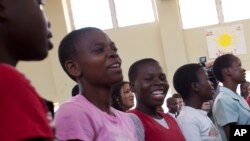BLANTYRE, MALAWI —
Human Rights Watch is appealing to Malawi's government to address what it calls “widespread child and forced marriage” in the country. The global rights watchdog says Malawi needs to set a lawful minimum marriage age to protect girls from abuse. Government officials claims efforts are already underway to address that problem.
Government statistics show that half of the girls in Malawi will marry by their 18th birthday; some will be forced to marry when they are as young as 9 or 10 years old. This is attributed to factors that include pressure from family members, pregnancy, or poverty.
The statistics also show that between 2010 and 2013, nearly 30,000 girls in primary school and 4,000 girls in secondary school dropped out due to early marriage.
During the same period, another 14,000 primary school girls and 5,000 secondary school girls dropped out because they were pregnant - contributing to the already high illiteracy rate for women, which is currently at 57 percent.
In its report, Human Rights Watch asks President Joyce Banda’s administration to support efforts that would help curb early child marriages.
“The government needs to set clear minimum marriage age and it has that opportunity because in 2006 it developed the Marriage, Divorce, and Family Relations Bill which it called the Marriage Bill. But eight years down the line it remains a bill and this is not a good sign that the government is committed to ending child marriage and protecting girls from abuses they face as a result of child marriage,” said Agnes Odhiambo, the Africa women’s rights researcher at Human Rights Watch.
Odhiambo said child marriage exposes girls to domestic and sexual violence.
Health workers say early pregnancy can lead girls to suffer from obstetric fistula, anemia and other complications that can cause the death of the baby or a mother.
The principal secretary of the Ministry of Gender, Children, and Social Welfare, Mary Shawa, told VOA that as the government awaits passage of the marriage law, it has engaged in other efforts to end early marriages.
“We are working with the chiefs to make sure that they develop bylaws in their own areas prohibiting child marriages and child pregnancies. The chiefs are going to provide penalties,” said Shawa.
Malawi's senior tribal chief, Chief Chitera, is among traditional leaders who have introduced bylaws against early marriages. She told VOA that the bylaws penalize any traditional leader or parent who authorizes the marriage of a girl younger than 21 years of age.
“The chiefs are penalized by paying seven goats to me. Parents who force their children into marriage would be fined to pay three chickens to their village headman and a goat to me, the ‘traditional authority,'” explained Chitera.
Chitera said there have been no cases of child marriage since the adoption of the bylaws in 2012.
The existing marriage law in Malawi allows girls to marry as early as 15 years, provided they have parental consent.
The revised marriage bill would put the minimum of 18 years as a marriage age, which Odhiambo of Human Rights Watch says conforms to international standards.
Government statistics show that half of the girls in Malawi will marry by their 18th birthday; some will be forced to marry when they are as young as 9 or 10 years old. This is attributed to factors that include pressure from family members, pregnancy, or poverty.
The statistics also show that between 2010 and 2013, nearly 30,000 girls in primary school and 4,000 girls in secondary school dropped out due to early marriage.
During the same period, another 14,000 primary school girls and 5,000 secondary school girls dropped out because they were pregnant - contributing to the already high illiteracy rate for women, which is currently at 57 percent.
In its report, Human Rights Watch asks President Joyce Banda’s administration to support efforts that would help curb early child marriages.
“The government needs to set clear minimum marriage age and it has that opportunity because in 2006 it developed the Marriage, Divorce, and Family Relations Bill which it called the Marriage Bill. But eight years down the line it remains a bill and this is not a good sign that the government is committed to ending child marriage and protecting girls from abuses they face as a result of child marriage,” said Agnes Odhiambo, the Africa women’s rights researcher at Human Rights Watch.
Odhiambo said child marriage exposes girls to domestic and sexual violence.
Health workers say early pregnancy can lead girls to suffer from obstetric fistula, anemia and other complications that can cause the death of the baby or a mother.
The principal secretary of the Ministry of Gender, Children, and Social Welfare, Mary Shawa, told VOA that as the government awaits passage of the marriage law, it has engaged in other efforts to end early marriages.
“We are working with the chiefs to make sure that they develop bylaws in their own areas prohibiting child marriages and child pregnancies. The chiefs are going to provide penalties,” said Shawa.
Malawi's senior tribal chief, Chief Chitera, is among traditional leaders who have introduced bylaws against early marriages. She told VOA that the bylaws penalize any traditional leader or parent who authorizes the marriage of a girl younger than 21 years of age.
“The chiefs are penalized by paying seven goats to me. Parents who force their children into marriage would be fined to pay three chickens to their village headman and a goat to me, the ‘traditional authority,'” explained Chitera.
Chitera said there have been no cases of child marriage since the adoption of the bylaws in 2012.
The existing marriage law in Malawi allows girls to marry as early as 15 years, provided they have parental consent.
The revised marriage bill would put the minimum of 18 years as a marriage age, which Odhiambo of Human Rights Watch says conforms to international standards.




